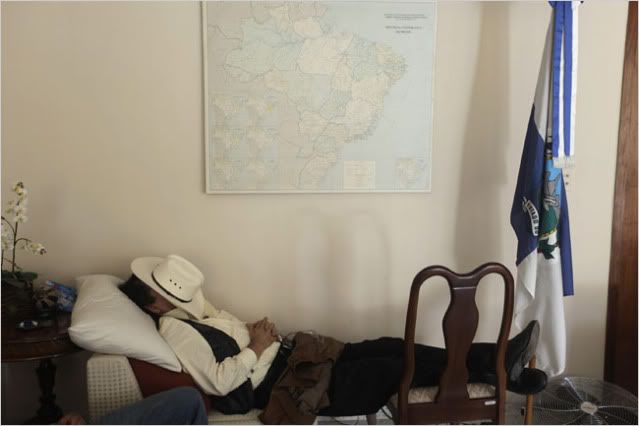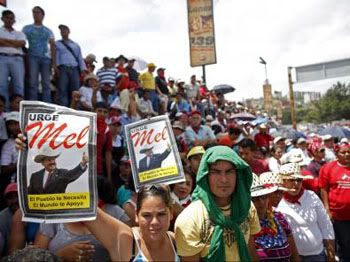You know. The one where agents of Roberto Micheletti seized duly elected President Manual Zelaya at gun point, put him on a plane in his pajamas, and flew him out of the country in June, 2009? Remember that? Remember how most countries, except the US, refused to accept the November, 2009 Honduran presidential election because the coup remained in power and Zelaya hadn’t been restored to his office on election day? Remember how after the election the US Government told us that was no big deal, that it would recognize the new Porfirio Lobo government anyway, and we should all move on, there was nothing to see? Have we forgotten all of that? Have we forgotten that Manual Zelaya found refuge in the Brazilian Embassy in Tegucigalpa in September, 2009, and that he’s still there, still confined in the embassy?
Porfirio Lobo is supposed to be sworn in as President of Honduras on Wednesday, January 27. And today’s news, which you probably wouldn’t otherwise have heard about, is about the failure of democracy in Honduras:
Ousted Honduran president Manuel Zelaya has accepted a deal to go to the Dominican Republic this week when his four-year term ends and his predecessor is sworn in, his top political adviser said.
Zelaya said that he will return “when there is a process of reconciliation”.
The ousted president said he can leave as an ordinary citizen on the 27th, leaving the Brazilian embassy where he has been in refuge since last September when he returned to Honduras….snip
Except for the United States, most of the other nations refuse to recognize the November elections as legitimate because the balloting took place under the regime of the puchistas, coup d’etat government.
Costa Rican president, Oscar Arias, …said he would not attend the Lobo swearing in ceremony on the 27th.
So it’s over. The golpe goes unavenged. Democracy in this hemisphere is at its most perilous because a coup might not be fought. And, of course, the right wing in the US continues to scream that despite the US’s complete betrayal of Manual Zelaya, the US is being too cozy with Hugo Chavez and events in Honduras somehow prove it.
If there was a “teachable moment” before or after the Honduras golpe de estado, about democracy in this hemisphere and the U.S.’s relationship to it, we’ve apparently forgotten what it might have been. 2010 in Honduras is looking a lot like 1910.
Updated: 1/26/10, 9:39 am ET: An answer to questions about who will attend the inauguration of Lobo:
Though Lobo, of the National Party, won the elections by a wide margin over the Liberal Party’s Elvin Santos, several countries refused to recognize the election results. Argentina, Brazil, and Spain opposed the vote, although Spain indicated it may recognize Lobo in the near-term. None of ALBA member countries – Bolivia, Cuba, Ecuador, Nicaragua, Venezuela, Antigua and Barbuda, Dominica, and Saint Vincent and the Grenadines-has recognized Lobo’s election, culminating in Honduras’s withdrawal from the trade bloc last week.
The United States, Colombia, Peru, Panama, and Taiwan were among the countries that recognized the election results. But, as The Economist points out, only the Panamanian and Taiwanese presidents will attend Lobo’s inauguration. Washington plans to send an envoy as well. Though Costa Rica recognized the election results, President Óscar Arias-who served as a central mediator in the political crisis-announced he will not attend the inauguration, stating that Micheletti’s refusal to resign before the power transfer constitutes a breach of power.
————————
simulposted at The Dream Antilles


